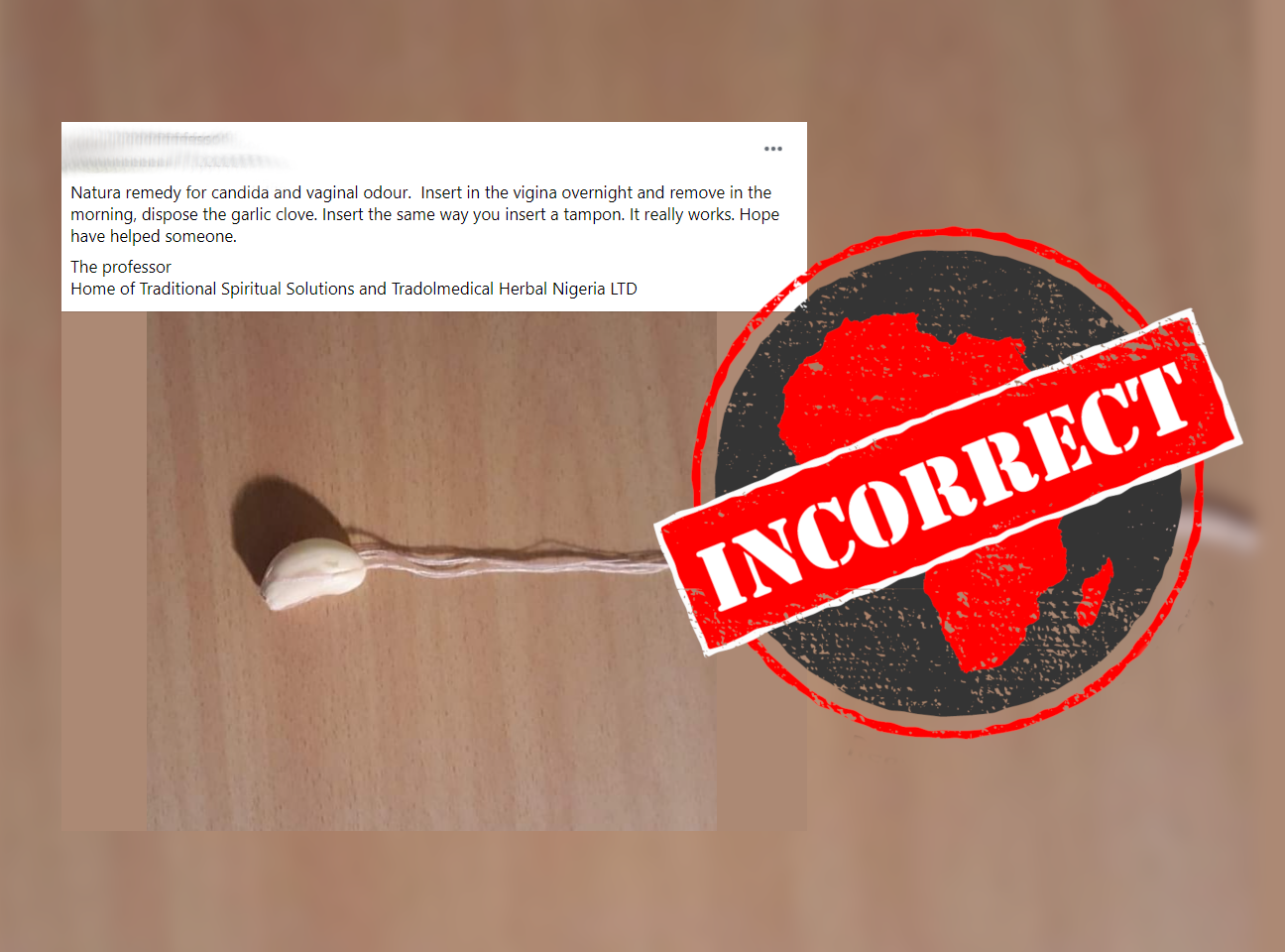“Natural remedy for candida and vaginal odour,” reads a post on Facebook in Nigeria. It shows a photo of a clove of garlic with pieces of string attached to it.
“Insert in the vagina overnight and remove in the morning, dispose of the garlic clove. Insert the same way you insert a tampon,” it says.
“It really works.”
But does it? We checked.

Difference between candida and candidiasis, or thrush
Candida is a fungus that lives on the skin and inside the body – in the mouth, throat, gut, and vagina and other places – usually without causing problems.
But if candida grows out of control it can cause candidiasis. The most common form of this infection is known as thrush. It can affect the vagina or penis, as well as the armpits, groin, mouth, throat and the area between the fingers.
Thrush is usually harmless but can be uncomfortable. Things that can trigger thrush include irritated or damaged skin, taking antibiotics, poorly controlled diabetes, a weakened immune system, hormone replacement therapy and pregnancy.
The symptoms of thrush in the vagina – known as vaginal candidiasis – include a white discharge, itching and irritation, and soreness during sex and when urinating.
What is vaginal odour?
It is normal for the vagina to have a certain smell, which may change during the menstrual cycle.
An abnormal vaginal odour could simply be because of poor hygiene. In some cases it can be caused by bacterial infection, a common sexually transmitted infection called trichomoniasis, or cervical cancer.
The British National Health Service (NHS) says the vagina keeps itself naturally clean with normal secretions. Use ordinary unscented soap to wash the area around the vagina every day, it says, and avoid douching or using antiseptics and perfumed soaps.
"Vaginal odour can change at different times of the reproductive cycle and shouldn't always be thought of as being a sign of infection or illness," Suzy Elneil, consultant in urogynaecology at University College Hospital, London, told the NHS.
Garlic in the vagina can cause harm
In 2013, research by a team of medical experts in Melbourne, Australia, found that garlic did not affect the amount of candida fungus in the vagina.
The study was published in the British Journal of Obstetrics and Gynaecology. It said there was no evidence that garlic could be used to treat vaginal candidiasis.
In fact, the women in the study who used garlic were said to have reported “more adverse effects” than the women who didn’t use garlic.
Africa Check asked Adegboyega Fawole, a professor of obstetrics and gynaecology at Nigeria’s University of Ilorin, about the claim and its garlic “remedy”.
“Candida is not a disease that people need a cure for; it is a naturally occurring microorganism. It contributes to the overall health of the vagina,” Fawole told us.
“However, if they are referring to candidiasis, an infection that is caused by an imbalance of the microorganism, then we can be talking about a cure, and that cure is not inserting garlic into the vagina.”
Michael Aziken, a professor of obstetrics and gynaecology and an infertility expert at the University of Benin college of medicine, also in Nigeria, said garlic could in fact cause harm.
“Complications can arise from using such things in the vagina,” he said.
Find out more in our health check that debunks four common myths about the vagina.
Republish our content for free
For publishers: what to do if your post is rated false
A fact-checker has rated your Facebook or Instagram post as “false”, “altered”, “partly false” or “missing context”. This could have serious consequences. What do you do?
Click on our guide for the steps you should follow.
Publishers guideAfrica Check teams up with Facebook
Africa Check is a partner in Meta's third-party fact-checking programme to help stop the spread of false information on social media.
The content we rate as “false” will be downgraded on Facebook and Instagram. This means fewer people will see it.
You can also help identify false information on Facebook. This guide explains how.


Add new comment